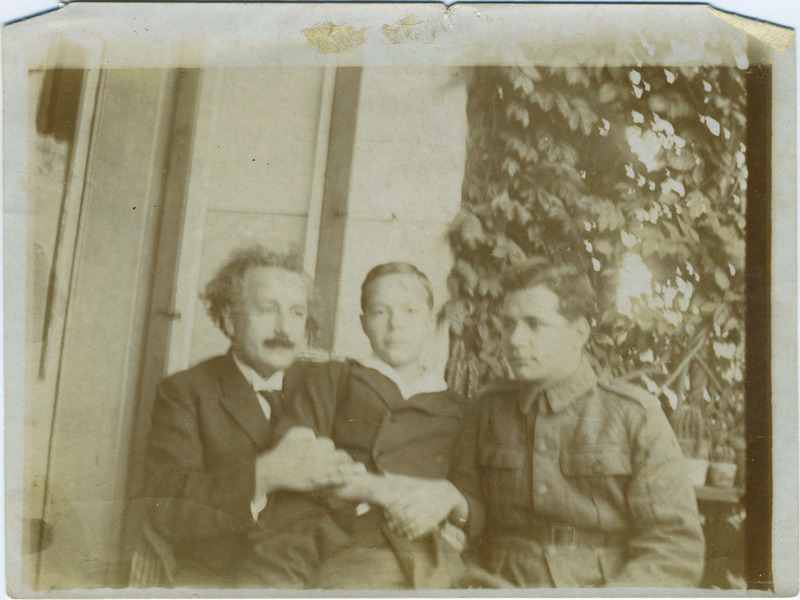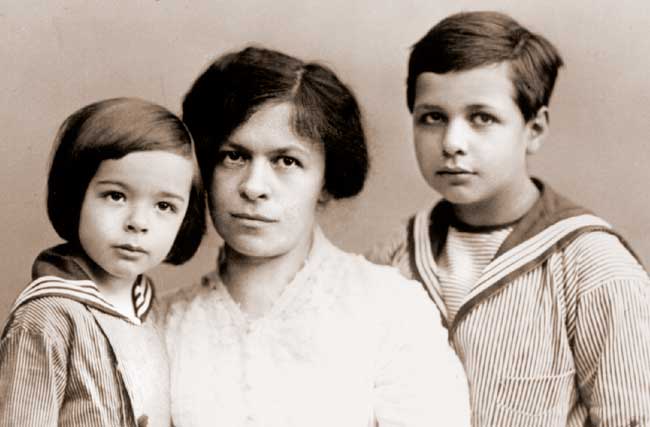Albert Einstein is the most famous scientist of the modern age. Everyone learns about his theory of relativity and the equation E=MC2 is common parlance.
There was more to Einstein’s life though, than being a brilliant physicist and household name. When he wasn’t making revolutionary scientific discoveries, Einstein was also a husband and a father.
From his first marriage, Albert had two sons: Hans Albert Einstein and Eduard Einstein. Hans followed in his father’s footsteps by becoming a renowned engineer and moving to America.
But Eduard’s emulation of his father was far less fortunate. After a lifetime of health struggles and tragedy, Eduard passed away at 55 years old, only outliving his father by 10 years.

A Family Separated
Eduard was born in Zurich, Switzerland on July 28, 1910. Four years later the Einstein family relocated to Berlin, Germany for Albert.
At this point, the family consisted of Albert, his first wife Mileva Maric, 10-year-old Hans, and 4-year-old Eduard. Albert affectionately referred to Eduard as Tete, a shortened form of the French word “petite”, since he was the youngest child.
However, Albert and Mileva divorced shortly after the move and Mileva took the children back to Switzerland with her. Although the family was now separated, Albert made sure to check in and visit his children. He even took them on trips with him to spend time with them.
Mileva claimed that science always came first in Albert’s life, but Hans recalled fond memories of the trips the boys would take with their father. In 1919 Albert remarried. In 1933, he emigrated to the United States to avoid the rise of the Nazi party in Germany.
But he consistently saw his children and inspired their growth
Eduard’s Childhood
Eduard was a sickly child who often missed the trips his father planned because of his illnesses. Much of his childhood was spent rotating through hospitals and sanitariums trying to find a solution to his illnesses with his parents.
This discouraged his father, who feared Eduard would never get to lead a normal life. He even stated in one letter that “It is impossible that (Eduard) would become a fully developed person.”
Despite these struggles, however, Eduard excelled in school and seemed to follow in his father’s footsteps. He became enamored with art and poetry, spending hours creating his own works.
His father also suggested the works of Sigmund Freud to Eduard, who quickly became obsessed with Freud’s theories, perhaps because they felt relatable to his own mental health struggles. This was the root of Eduard’s interest in the field of psychiatry.

Struggles at College
In 1929 he began attending Zurich University, his father’s alma mater, pursuing a degree in medicine with a focus on psychiatry. While he performed well in his classes, he struggled under the burden of his father’s reputation while at school.
At this point, Albert was world-renowned for his theoretical physics. That put a lot of additional pressure on his son, who already struggled with mental illness. Then, emulating his father again, Eduard fell in love with an older woman at university.
Albert had met Mileva while at the Zurich Polytechnic Institute and became enamored although she was four years older than him. Unlike his father though, who went on to marry Mileva, Eduard’s relationship fell apart.
When he could not handle the pain, he attempted to take his own life. This resulted in the first of many times Eduard would be admitted to Burghölzli Hospital for his own mental well-being.
The Diagnosis and Treatment
At 22, Eduard began showing symptoms and was diagnosed with schizophrenia. While in the hospital he was treated for his schizophrenia with electroconvulsive therapy. This involves sending electrical currents through the brain to cause seizures and alter brain chemistry.
Although supposedly a treatment, his family believed that the therapy he received actually worsened his condition over the course of his life. Eventually, Eduard’s ability to speak and even think was irreparably damaged.
Albert was heartbroken by his son’s condition and deteriorating mental state. But he could do little more to help than send money to support the family.
When he was forced to flee Germany in 1933, Albert convinced Hans to join him in emigrating to America. He attempted to convince Eduard as well. However, Eduard’s deteriorating state prevented him from being able to make the journey.
This forced Albert to give what would be his final farewell to his youngest son before departing.
The Final Years
After Albert and Hans left Europe, Mileva alone was left to care for Eduard. Even with the money that Albert sent from his job at Princeton, the cost of Eduard’s care became overwhelming.
Mileva did everything she could to help him, including writing to renowned psychologist Carl Jung, who never answered her letter. In 1948 Mileva passed away, and Eduard went into the care of Burghölzli Hospital for the remainder of his life.
He spent the time writing poetry and creating art, as well as writing letters to his father until Albert passed in 1955. Eduard then died in 1965 of a stroke, across the world from his only remaining family, and separated from the legacy of his father.
Eduard spent his entire life in the shadow of a father who was simultaneously absent and larger than life. He inherited his father’s intellect and curiosity, but mental illness and brutal therapy techniques hindered his performance and ability to socialize.
Despite the circumstances, Eduard tried to live a life filled with the things he loved: art, poetry, and family.
References
“Eduard Einstein: The Tragic Life of Einstein’s Brightest Son.” Odd Feed. https://oddfeed.net/eduard-einstein/
Halpern, Paul. “Mileva Einstein’s Desperate Plea to Carl Jung: Help Me with my Son!” Medium, June 29, 2020. https://phalpern.medium.com/mileva-einsteins-desperate-plea-to-carl-jung-help-me-with-my-son-f3d2d01556f9.
Navilon, Genefe. “Eduard Einstein: The tragic life of Albert Einstein’s forgotten son.” Ideapod, 2018. https://ideapod.com/eduard-einstein-the-tragic-life-of-albert-einsteins-forgotten-son/

